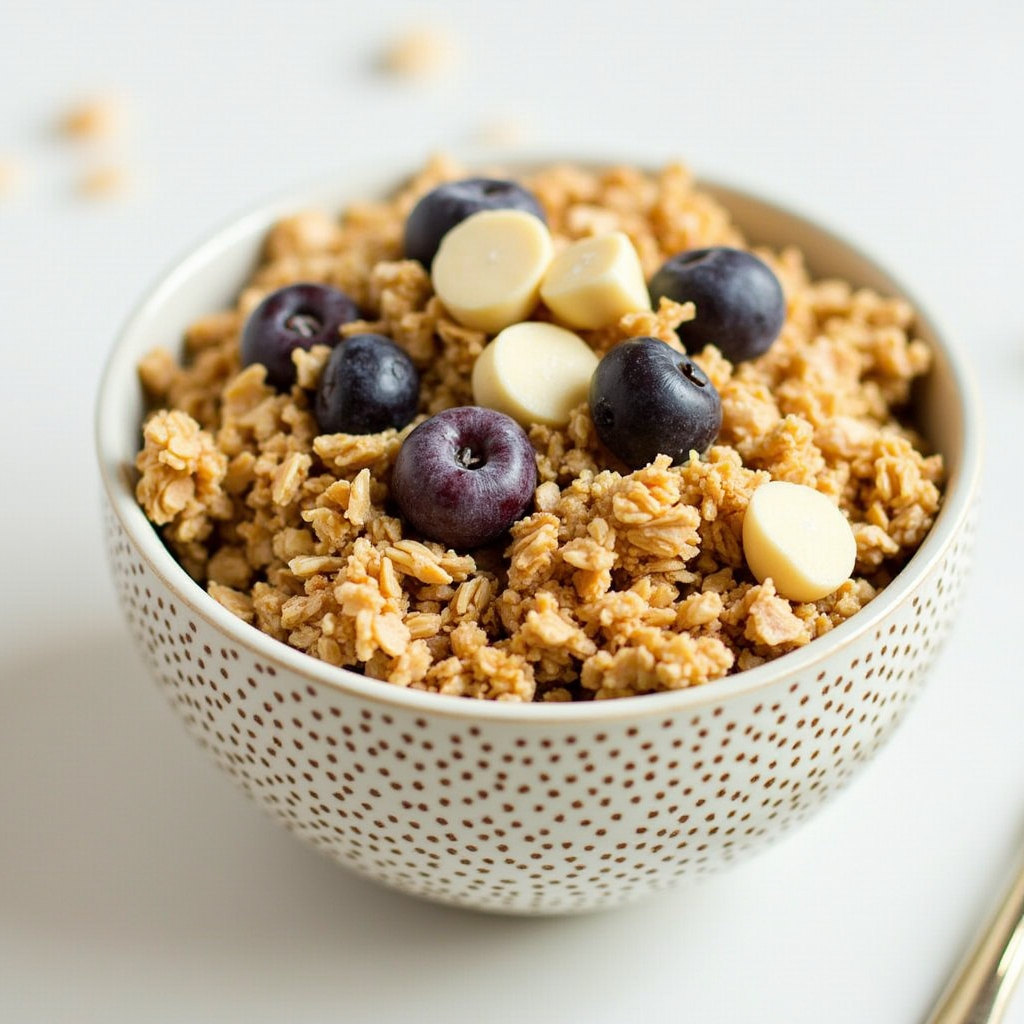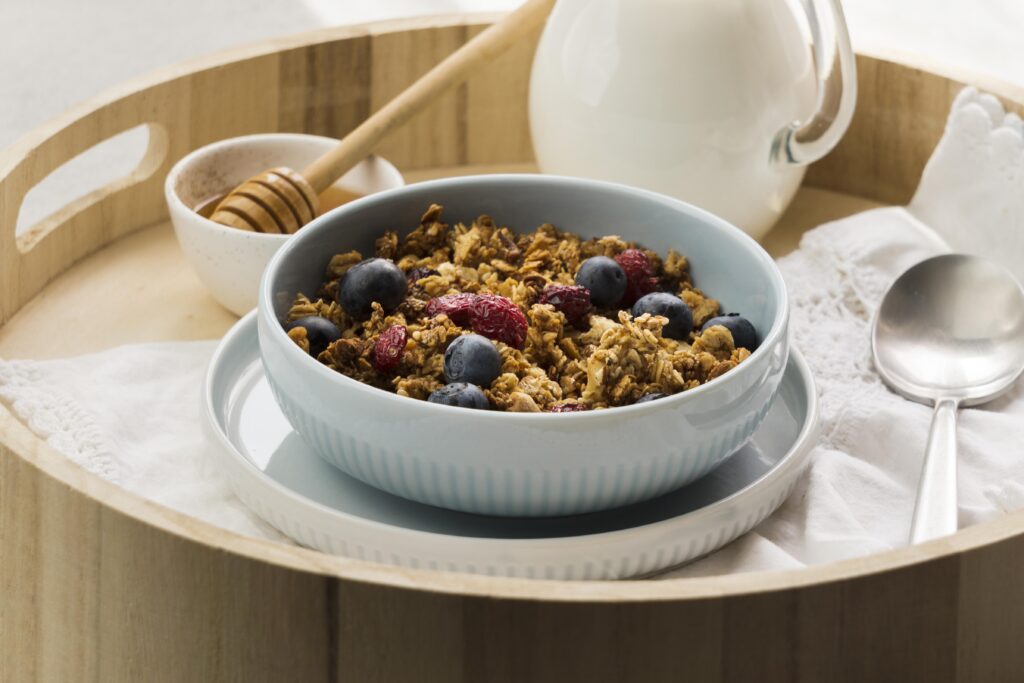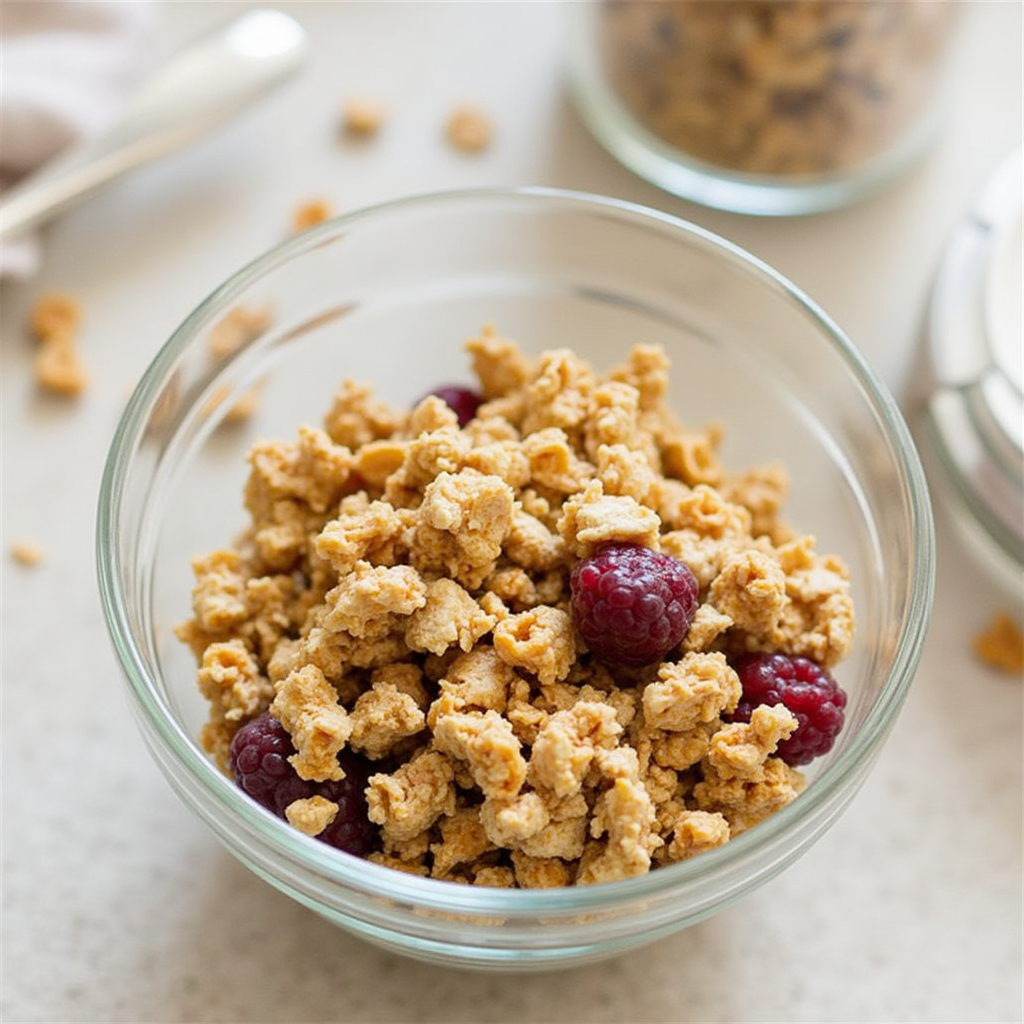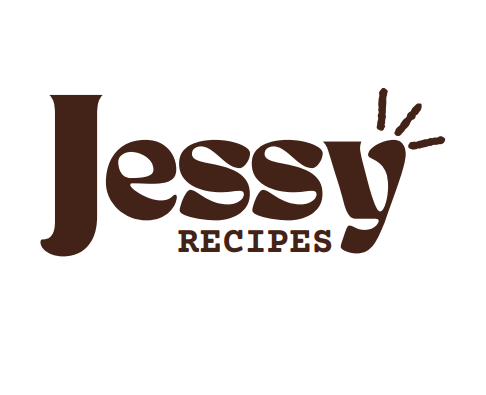The Ultimate Guide to a Nutritious Breakfast
Introduction
Granola has long been a favorite breakfast option for health-conscious individuals. Packed with fiber, protein, and essential nutrients, it’s a delicious and versatile food that can be customized to suit your dietary needs. In this comprehensive guide, we will explore everything about healthy homemade granola, from ingredients and preparation methods to its numerous health benefits. By the end of this article, you will have a perfect granola recipe that aligns with your health goals.
What is Granola?
Granola is a crunchy, toasted mixture of oats, nuts, seeds, dried fruits, and sweeteners. It is often enjoyed with yogurt, milk, or eaten as a snack. Unlike store-bought versions, homemade granola allows you to control the ingredients, ensuring you get a nutritious and wholesome product.
The Origins of Granola
Granola has an interesting history that dates back to the 19th century. It was first created by Dr. James Caleb Jackson, a nutrition advocate who developed a baked wheat and oat cereal called “granula.” Later, John Harvey Kellogg, the creator of Kellogg’s cereals, modified the recipe and renamed it “granola.” Over time, granola became a staple food for hikers and adventurers due to its energy-boosting properties. Today, it is enjoyed worldwide in various forms.
Health Benefits of Homemade Granola
1. High in Fiber
Oats, a primary ingredient in granola, are rich in fiber, which helps improve digestion and promotes gut health. Fiber also supports heart health by lowering bad cholesterol levels.
2. Rich in Healthy Fats
Nuts and seeds contain healthy fats that support brain function, reduce inflammation, and provide long-lasting energy.
3. Packed with Protein
Adding nuts and seeds increases the protein content, making granola a satisfying breakfast or snack. Protein helps with muscle repair and keeps you feeling full longer.
4. Natural Energy Booster
Granola provides sustained energy due to its combination of complex carbohydrates, proteins, and healthy fats. This makes it an excellent choice for athletes and active individuals.
5. Supports Weight Management
When consumed in moderation, granola can aid in weight management by keeping hunger pangs at bay and reducing the likelihood of unhealthy snacking.
6. Rich in Antioxidants
Many granola ingredients, such as nuts, seeds, and dried fruits, are packed with antioxidants that help fight oxidative stress and promote overall well-being.

Essential Ingredients for Homemade Granola
1. Oats
Use whole rolled oats for the best texture and nutritional value. Avoid instant oats, as they may not hold up well during baking.
2. Nuts and Seeds
Almonds, walnuts, cashews, sunflower seeds, pumpkin seeds, and chia seeds add crunch and essential nutrients.
3. Sweeteners
Opt for natural sweeteners like honey, maple syrup, or coconut sugar instead of refined sugar to keep your granola healthy.
4. Healthy Oils
Coconut oil or olive oil helps bind the ingredients together and adds a rich flavor. Avoid processed vegetable oils.
5. Dried Fruits
Raisins, cranberries, dried apricots, and goji berries provide natural sweetness and a chewy texture. Be mindful of added sugars in dried fruits.
6. Flavor Enhancers
Cinnamon, vanilla extract, nutmeg, and sea salt can elevate the taste of your granola without adding extra calories.
How to Make Healthy Homemade Granola
Step 1: Preheat Your Oven
Preheat your oven to 325°F (163°C) and line a baking sheet with parchment paper.
Step 2: Mix Dry Ingredients
In a large bowl, combine oats, nuts, seeds, and a pinch of salt.
Step 3: Add Wet Ingredients
Mix in melted coconut oil and your preferred natural sweetener until everything is evenly coated.
Step 4: Bake
Spread the mixture onto the prepared baking sheet and bake for 20-25 minutes, stirring occasionally to ensure even toasting.
Step 5: Add Dried Fruits
Once baked, mix in dried fruits and let it cool before storing in an airtight container.

Best Ways to Enjoy Granola
- With Yogurt and Fresh Fruits – A nutritious breakfast option.
- As a Snack – Eat it dry for a crunchy treat.
- With Milk or Plant-Based Alternatives – A classic cereal-style meal.
- Topping for Smoothie Bowls – Adds texture and nutrition.
- As a Baking Ingredient – Use it in cookies, muffins, or energy bars.
Storage Tips
Short-Term Storage
Keep your granola in an airtight container at room temperature for up to two weeks.
Long-Term Storage
For longer storage, freeze granola in a sealed bag or container for up to three months. Ensure it is completely cool before freezing.
Customizing Your Granola
One of the biggest advantages of making homemade granola is the ability to customize it. Here are some ideas:
- Keto Granola: Use coconut flakes, nuts, seeds, and avoid oats and sweeteners.
- Protein Granola: Add protein powder to the mixture before baking.
- Chocolate Granola: Mix in cocoa powder or dark chocolate chips.
- Spiced Granola: Add cardamom, ginger, or pumpkin spice for seasonal flavors.
Common Mistakes to Avoid
- Using Too Much Sweetener: Excess sugar can make granola overly sticky and high in calories.
- Baking at High Temperatures: This can cause burning instead of toasting.
- Skipping the Stirring Process: Regular stirring ensures even baking.
- Not Letting Granola Cool Before Storing: Warm granola can trap moisture and become soggy.
Common Mistakes to Avoid
- Using Too Much Sweetener: Excess sugar can make granola overly sticky and high in calories.
- Baking at High Temperatures: This can cause burning instead of toasting.
- Skipping the Stirring Process: Regular stirring ensures even baking.
- Not Letting Granola Cool Before Storing: Warm granola can trap moisture and become soggy.

The Environmental Benefits of Homemade Granola
Making your own granola at home is not just a healthier choice, but also an eco-friendly one. Store-bought granola often comes in plastic packaging, contributing to waste and pollution. By preparing granola at home, you can store it in reusable glass jars or eco-friendly containers, reducing your carbon footprint. Additionally, sourcing organic and locally-produced ingredients supports sustainable farming practices and minimizes the environmental impact of food production.
Conclusion
Making your own healthy homemade granola is simple, cost-effective, and allows you to customize ingredients to fit your dietary needs. With this guide, you’re well-equipped to create a delicious and nutritious granola that the whole family will love.
Try making this granola recipe and let us know your favorite ingredient combinations in the comments below!
For more healthy recipes, visit RecipesJessy.com and follow us on Instagram for daily inspiration!

Healthy Homemade Granola
Equipment
- Oven
- Baking Sheet
Ingredients
Dry Ingredients
- 3 cups rolled oats
- 1 cup almonds chopped
- 1/2 cup walnuts chopped
- 1/2 cup pumpkin seeds
- 1/4 cup chia seeds
Wet Ingredients
- 1/3 cup coconut oil melted
- 1/3 cup honey or maple syrup
- 1 tsp vanilla extract
- 1 tsp cinnamon
- 1/2 tsp sea salt
Additional Ingredients
- 1/2 cup dried cranberries
- 1/2 cup raisins
Instructions
- Preheat the oven to 325°F (163°C) and line a baking sheet with parchment paper.
- In a large bowl, mix oats, nuts, seeds, cinnamon, and salt.
- In a separate bowl, whisk together melted coconut oil, honey or maple syrup, and vanilla extract.
- Pour the wet ingredients over the dry ingredients and mix well to coat evenly.
- Spread the mixture evenly on the baking sheet.
- Bake for 20-25 minutes, stirring every 10 minutes to ensure even toasting.
- Remove from the oven and let cool completely before adding dried fruit.
- Store in an airtight container for up to two weeks.
